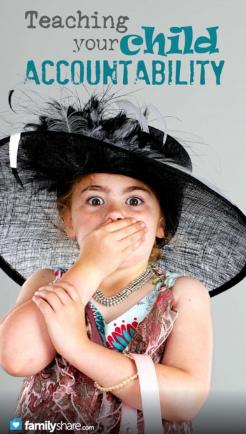
My daughter looked up at me with her big blue eyes and told a blatant lie. "I promise my room is clean, now can I go play?" She had been in there for five minutes. Even I, with super speed, could not have accomplished that feat. I looked down at her, mortified that she was lying, and said, "Are you telling me the truth?" The look on her face said no, but her lips whispered yes. She was obviously uncomfortable with lying, so why couldn't she just own up to her mistake and be accountable for her room?
Linda and Richard Eyre, prominent speakers on parenting and families, explore the rising generation and the bad choices they make. All the questions they had came back to one problem, entitlement. In their book, The Entitlement Trap, they explain, "Entitlement is a double-edged sword (or a double-jawed trap) for kids. On one edge it gives kids all that they don't need - indulgence, dullness, conceit and laziness; and on the other it takes from them everything they do need - motivation, independence, inventiveness, pride, responsibility and a chance to really work for things and to build their own sense of fulfillment and self-esteem."
When we look at our children, and this world we live in, it's easy to become discouraged with all the entitlement being dished out, and the lack of accountability. Here are some tips how to teach a child to take responsibility for their actions and battle entitlement.
It starts at home
Be present in your child's life at all times. Accountability is not a value successfully taught once in a while, or only when your child makes a mistake. It is instilled in them drop by drop. Create an environment in your home conducive to teaching. For example, we have a small bookshelf in our living room that has the monthly theme on it. Every month we try to pick something we know our children need help with and work on it - in-depth, once a week. Having it posted for all to see makes it easier to bring our smaller life lessons back to this theme.
Don't talk down to your child, have your child speak up
When my daughter lied to me, I was mortified. I didn't even realize she knew how to lie. Looking at her disaster of a room, I wanted to give her a lecture on lying and laziness right then and there. Fortunately, I took a breath and thought hard. I looked down and asked if her room was clean. She said no, and looked at the floor. I then asked why she told me it was clean. She put her hand over her mouth. I asked what's wrong, she replied, "I don't want to say it." She knew that if she admitted out loud that she had lied, she had to own that lie. Even at 6 years old she knew what ownership was.
This was a turning point for me. I realized, to help my children understand accountability, they need to speak. A child must admit to hitting his brother and admit to doing something wrong. Don't tell your children what they did wrong, help them to vocalize it, out loud and own it.
Be the example
Ownership is taught by example. A child will more openly admit her mistake if you admit to your's. I remember the first time I got down and told my son I was sorry for being angry and yelling. It hadn't been bad, but I knew it was wrong. He looked at me wide-eyed and said, "Mommies make mistakes?"
By owning my mistake I taught him it was OK to own his mistakes and OK to admit he was wrong. By admitting you are wrong, you are able to fix your mistake. Denial just compounds the problem.
Allow your child the opportunity to learn
If your son runs over the neighbor's flowers with his bike, after he admits the wrong, let him fix it. If your daughter calls her brother a name, help her to own her mistake, and then let her make amends.
Owning your mistake is only half the battle. Accountability requires us to fix our mistakes to the best of our ability. Just like the repentance process we go through with God, our children need to admit their mistakes, own their mistakes, and fix their mistakes, if they can. That includes receiving our full forgiveness and compassion. When a child has shown accountability, we need to let go of our frustrations as well.
Older Children
If your child is old enough to reason, ask him what appropriate consequences would be and how he plans to make amends. Then follow through with his choice of consequences. While rewarding efforts to be honest and make amends, as well as rewarding and acknowledging accountable behaviors, you can reinforce good behaviors.
Helping your child become accountable for all she does and says has great implications for the future. An accountable child becomes an accountable adult, who has a brighter future in his professional and personal life, a better marriage and becomes a better parent. Your efforts affect your children's entire lives, so give them all you have.

